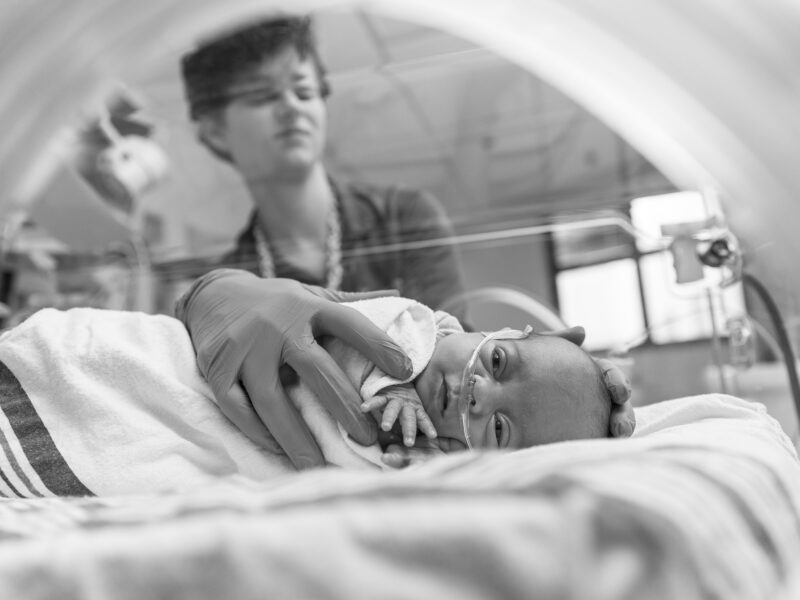Shorter Course of Antibiotics for Early Onset Sepsis as Safe as Longer Course
Shorter Course of Antibiotics for Early Onset Sepsis as Safe as Longer Course https://pediatricsnationwide.org/wp-content/themes/corpus/images/empty/thumbnail.jpg 150 150 Jessica Nye, PhD Jessica Nye, PhD https://secure.gravatar.com/avatar/?s=96&d=mm&r=g- April 24, 2023
- Jessica Nye, PhD
Discontinuing empirical antibiotic therapy for early-onset sepsis (EOS) at 24 hours had a similar safety profile as the standard 48-hour treatment course.
“In the neonatal intensive care unit (NICU), we have data to show that each additional day of unnecessary antibiotics leads to adverse side effects, both short term while in the NICU and some longer-term consequences,” says Pavel Prusakov, PharmD, of Nationwide Children’s Hospital. “We’ve noticed that the majority of pathogenic [EOS] bacteria grow in blood culture in less than 24 hours. The standard dogma has been that you don’t discontinue antibiotic treatment regardless of what the culture shows for 48 hours. But we know each day of antibiotics can lead to adverse outcomes. So, we decided that we could reduce the duration of the rule-out sepsis period to 24 hours instead of 48 hours.”
To test whether a shorter treatment period was safe, a retrospective study from Dr. Prusakov and his colleagues published in the Journal of Perinatology evaluated outcomes of suspected EOS cases among newborns aged <72 hours treated at six Nationwide Children’s Hospital NICUs from 2018 to 2019. The standard protocol was to stop antibiotic therapy at 24 hours unless the provider decided to extend treatment to 48 hours.
During the study period, 414 newborns suspected of EOS received a 24-hour (47%) or 48-hour (53%) rule-out sepsis antibiotic course. The infants treated with the shorter antibiotic course were born more premature (mean, 33.7 vs. 34.8 weeks; P =.02) and had lower birth weight (mean, 2327 vs. 2512 g; P =.05) than the longer-course recipients, respectively.
The 24-hour antibiotic therapy did not differ from the 48-hour course for rates of overall mortality (3% vs. 4%; P =.46) or sepsis-related mortality (2% vs. 0%; P =.1), respectively. None of the sepsis-related deaths were associated with early-onset infections.
“I’m not surprised that the shorter course was safe. I thought that it was safe, and that’s why we implemented [this protocol],” says Pablo Sánchez, MD, of the Center for Perinatal Research at Nationwide Children’s, professor of Pediatrics at The Ohio State University College of Medicine and lead author of the study. “These antibiotics don’t just disappear at the time that you stop giving them. The exposure actually lasts much longer. We monitor these patients and see whether the baby needs to have antibiotics continued beyond 24 hours by performing a Time-Out at 24 hours.”
The short-course antibiotic treatment was associated with a lower rate of antibiotic re-initiation within seven days (5% vs 11%; P =.02), fewer total days of antibiotic exposure during the NICU stay (median, 2 vs. 3 days; P <.01) and a shorter hospitalization (median, 19 vs. 22 days; P <.01) compared with the longer-course treatment, respectively.
“It’s important to recognize that we are able to do this because of modern blood culture techniques and the collaboration with the microbiology laboratory along with the Neonatal Antimicrobial Stewardship Program team. The role of the microbiology lab in this work cannot be overemphasized. It’s really important that our microbiology labs work 24-hours a day and update us on blood culture results. There are rapid diagnostic tests that are in development, and I think that as more advanced technology is brought to the clinical arena by microbiologists, we will be able to reduce antibiotic duration even more in the future,” concludes Dr. Sánchez.
Reference:
Sánchez P, Prusakov P, de Alba Romero C, Zamora-Flores E, Escamilla MR, White N, Miller R, Moraille R, Thiele A, Magers J. Short-Course Empiric Antibiotic Therapy for Possible Early-Onset Sepsis in the NICU. J Perinatol. Published online February 22, 2023.
About the author
Jessica Nye, PhD, is a freelance science and medical writer based in Barcelona, Spain. She completed her BS in biology and chemistry and MS in evolutionary biology at Florida State University. Dr. Nye studied population genetics for her doctorate in biomedicine at University of Pompeu Fabra. She conducted her postdoctoral research on the inheritance of complex traits at the Autonomous University of Barcelona.
-
Jessica Nye, PhDhttps://pediatricsnationwide.org/author/jessica-nye-phd/
-
Jessica Nye, PhDhttps://pediatricsnationwide.org/author/jessica-nye-phd/
-
Jessica Nye, PhDhttps://pediatricsnationwide.org/author/jessica-nye-phd/January 3, 2022
-
Jessica Nye, PhDhttps://pediatricsnationwide.org/author/jessica-nye-phd/
- Post Tags:
- Antibiotic Stewardship
- NICU
- Sepsis










